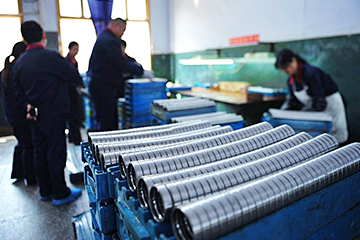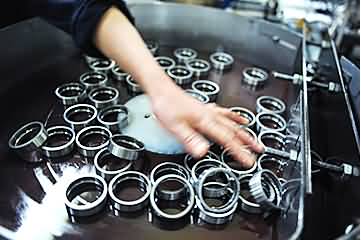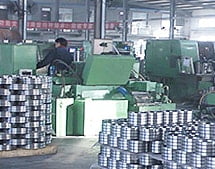Bearing ring producing process
Bearing ring is an important part of contemporary machinery and equipment. Its main function is to support the mechanical rotating body, reduce the friction coefficient during its movement, and ensure its rotation accuracy. According to the different friction properties of the moving elements, the bearings can be divided into two major categories of rolling bearings and sliding bearings. The bearing can bear radial load and axial load at the same time. Can work at higher speeds. The greater the contact angle, the higher the axial load carrying capacity.
How is the bearing processed?

The basic process of bearing ring manufacturing and processing (focusing on the basic process of manufacturing the ferrule, the material selection of high-carbon chromium bearing steel Gcr15SiMn)
<1>The basic flow of rolling element (steel ball) manufacturing: Raw materials - cold heading - light grinding - heat treatment - hard grinding - preliminary research - appearance - lapping
<2>Cage (steel plate) manufacturing basic flow: Raw material - cutting material - cutting ring - finishing - forming - shaping - punch rivet hole
<3> Ferrules (Inner Ring, Outer Ring) Manufacturing Basic Flow: Raw Materials - Forging - Annealing - Turning - Quenching - Tempering - Grinding - Assembly
(1) Forging processing: Forging processing is the initial processing of bearing ring, also known as rough machining. The main purpose of the ring forging process is:
(a) Obtaining blanks with similar shapes to products, thereby increasing the utilization rate of metal materials, saving raw materials, reducing the amount of machining, and reducing costs.
(b) Elimination of metal internal defects, improvement of metal structures, rational distribution of metal flow lines, and good metal tightness, thereby increasing the service life of the bearings. Forging method: It is generally performed in the equipment body connected with the induction heating furnace, press, reaming machine and shaping machine.
(2) Annealing: The main purpose of the ferrule annealing is that the spheroidizing annealing of the high-carbon chromium bearing steel is to obtain a uniform distribution of fine, small, uniform, and round carbide grains on the ferrite matrix. Cold processing and final quenching and tempering are used for organizational preparation.

The basic process of Gcr15SiMn annealing:
Incubate at 790-810°C for 2-6h, 10-30°C/h, cool to below 600°C, air cooled
(3) Turning: Turning is the processing of semi-finished bearing ring. It can also be referred to as molding. The main purpose of turning is:
(a) Make the finished ferrule exactly the same shape as the final product.
(b) Create favorable conditions for the subsequent grinding process. Turning method: Concentrated process method: Complete small-volume production of all turning operations on a single machine. Dispersion process method: A mass production of a certain turning process is completed on a single device.
(4) Heat treatment: Heat treatment is a key processing step to improve the intrinsic quality of the bearing ring. The main purpose of heat treatment is:
(a) The heat treatment changes the structure of the material and improves the mechanical properties of the material.
(b) Improve the bearing's intrinsic quality (wear resistance, toughness), and thus increase bearing life. For high-carbon chromium bearing steel Gcr15SiMn, the heat treatment includes quenching and tempering at low temperature: Heating temperature: 820-840 (°C) Holding time: 1-2h Cooling medium: Tempering temperature of oil: Heating temperature: 150-180 (°C) Insulation Time: 2-5h Cooling method: air cooling

(5) Grinding: Grinding is the final processing of bearing ring and rollers, called finished machining. The main purpose of grinding is:
(a) Meet the design requirements for the dimensional accuracy and shape accuracy of the ferrule.
(b) Provide a qualified ferrule for the bearing assembly. Grinding processing methods: generally use the dispersion process method, but also can be more than one piece of equipment through the upper and lower feed devices connected to the composition of the production line processing, improve production efficiency.
(6) Bearing assembly: Bearing assembly is the final step in the bearing ring production process and has an important bearing on bearing performance. The main purpose of bearing assembly is:
(a) Assembling parts (outer rings, inner rings, rollers, and cages) that have been processed in a variety of processes into bearing products.
(b) Assembled into bearing products with various precisions, various clearances and other special requirements according to different technical requirements.
Double row angular contact ball bearing installation is more complex than deep groove ball bearin...
Failure reason of micro miniature bearing About 40% of the failure of micro miniature bearings i...
Novice Mistakes 1: Do not consider the characteristics of your own actions, blindly choose Althou...
When assembling cnc machine bearings, the Venus machine tool must be preloaded, so that the origi...
Performance characteristics of stainless steel self-aligning ball bearing Self-aligning ball bear...
The long board has a strong sense of operation and is quick to get started. The longboard is a mu...
The tapered thrust bearing with cage is a split design so that the two washers as well as the rol...
Disassembly of the tapered needle bearing: When the bearing is to be used continuously after it i...

TEL: +86 183-6303-1398
E-mail: [email protected]
E-mail: [email protected]
Whatsapp: +8618668909563
Whatsapp: +8618363031398
ADD: Room E3-1203, Mingquanchunxiao, Dikou Road, Tianqiao District, Jinan City Shandong Province, China.